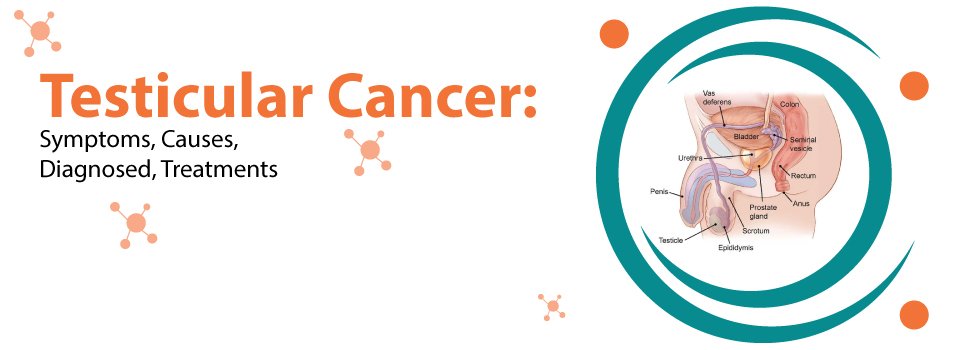Testicular cancer is a rare type of cancer that affects the testicles, which are the male reproductive glands that produce sperm and testosterone. Testicular cancer is highly treatable if caught early, which is why it’s essential to know the symptoms and seek medical attention if you experience any of them. In this blog, we’ll discuss the common symptoms of testicular cancer and provide information on how it is diagnosed and treated.
What is meant by Testicular Cancer?
The type of cancer develops in the testicles, which are the male reproductive glands located inside the scrotum. The testicles are responsible for producing sperm and testosterone, which is the hormone that controls male characteristics like muscle mass and body hair. Testicular cancer occurs when the cells in the testicles begin to grow uncontrollably and form a tumor. It is a relatively rare form of cancer, accounting for less than 1% of all cancers in men. It is the most prevalent type of cancer for young males between the ages of 15 and 35. Testicular cancer is highly treatable, especially if it is caught early, and the survival rates are generally very good.
Testicular Cancer Symptoms
Below mentioned are the most common symptoms of testicular cancer:
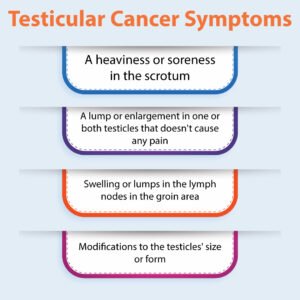
● A heaviness or soreness in the scrotum
● A lump or enlargement in one or both testicles that doesn’t cause any pain.
● Swelling or lumps in the lymph nodes in the groin area
● Modifications to the testicles’ size or form
It’s important to note that not all testicular lumps or swelling are cancerous, and not all cases of testicular cancer cause symptoms. However, if you experience any of these symptoms, it is important to seek medical attention right away, especially if the symptoms persist for more than a few weeks.
Testicular Cancer Causes
These risk factors include:
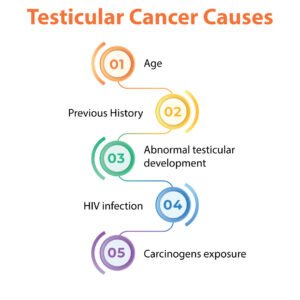
● Age: Testicular cancer is more common in young and middle-aged men, particularly between the ages of 15 and 35.
● Previous history: Men who have had testicular cancer in one testicle are at an increased risk of developing it in the other testicle.
● Abnormal testicular development: Men with testicles that did not descend normally into the scrotum at birth are at an increased risk of developing testicular cancer.
● HIV infection: Men with HIV or other conditions that weaken the immune system may be at an increased risk of developing testicular cancer.
● Carcinogen exposure: Exposure to certain chemicals, such as pesticides, is also thought to increase the risk of testicular cancer.
Testicular Cancer Diagnosis
If a healthcare provider suspects that a person may have testicular cancer, they will perform a physical exam and may order additional tests to make a diagnosis. These tests may include:
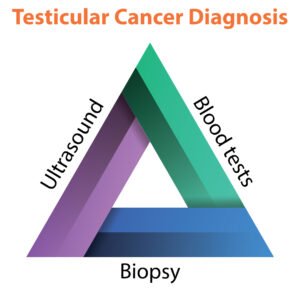
• Physical Examination: Your doctor will perform a physical examination of your testicles and scrotum to check for any lumps or swelling. They may also examine your abdomen and groin to check for any enlarged lymph nodes.
• Medical History: Your doctor will ask you about your medical history, including any family history of testicular cancer, past medical problems, and medications you are currently taking.
● Ultrasound: This imaging test uses sound waves to create images of the testicles and can help to determine whether a lump is solid or filled with fluid.
● Blood tests: Blood tests can be used to measure levels of tumor markers, which are substances produced by some types of cancer cells. In some cases, these markers can help to confirm a diagnosis of testicular cancer.
● Biopsy: In some cases, a biopsy may be necessary to confirm a diagnosis of testicular cancer.
If testicular cancer is diagnosed, additional tests may be ordered to determine the stage of cancer and whether it has spread to other parts of the body. Once the stage of the cancer is determined, a healthcare provider can work with the patient to develop an appropriate treatment plan.
Testicular Cancer Treatment
The treatment for testicular cancer depends on several factors, including the type and stage of cancer, as well as the patient’s overall health and preferences. Below mentioned are the common treatments for testicular cancer:
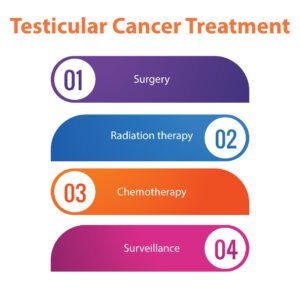
● Surgery: The primary treatment for testicular cancer is surgery to remove the affected testicle, a procedure known as a radical inguinal orchiectomy. In most cases, only one testicle is removed, and the other one can still function normally.
● Radiation therapy: Radiation therapy may be used after surgery to kill any remaining cancer cells, or it may be used as the primary treatment for certain types of testicular cancer.
● Chemotherapy: Chemotherapy uses drugs to kill cancer cells. It may be used before or after surgery, or it may be used as the primary treatment for advanced or aggressive forms of testicular cancer.
● Surveillance: In some cases, especially for early-stage and slow-growing cancers, surveillance or “watchful waiting” may be recommended. This involves regular monitoring with imaging tests and blood tests to ensure the cancer does not progress.
Even if it has spread to other bodily areas, testicular cancer is typically quite curable. The survival rates for testicular cancer are generally very good, with over 95% of men being cured of the disease.
Conclusion
In conclusion, testicular cancer is a relatively rare but highly treatable form of cancer that affects men. The most common symptoms of testicular cancer include a painless lump or swelling in one or both testicles, a feeling of heaviness or discomfort in the scrotum, pain or a dull ache in the testicles or scrotum, swelling or lumps in the lymph nodes in the groin area, changes in the size or shape of the testicles, and pain or discomfort in the lower abdomen or back. If you experience any of these symptoms, it is important to seek medical attention right away, especially if the symptoms persist for more than a few weeks.
Dr Satish Sharma, a leading urologist, has extensive experience in treating testicular cancer. He recommends that men perform regular self-exams of their testicles to check for any lumps or abnormalities. If you notice anything unusual or have any concerns, don’t hesitate to speak with a healthcare provider.

